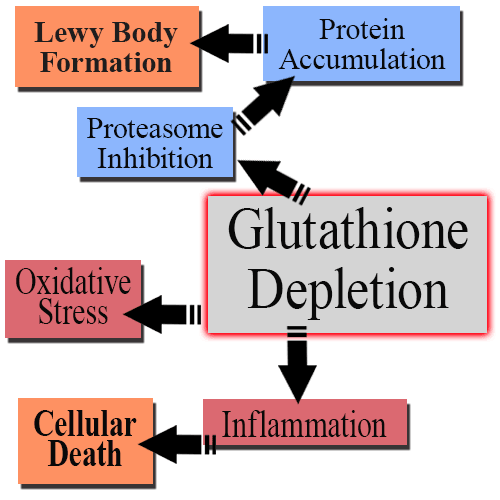Before understanding the relationship between Glutathione and Parkinson’s Disease it is important to be clear on just how Parkinson’s Disease affects the body.
Understanding Parkinson’s Disease
It is a central nervous system disorder that is often characterized by hand tremors due to its effect on motor skills. Sufferers can demonstrate any number of symptoms including:
Symptoms of Parkinson’s Disease
-
Slurred or Slowed Speech
-
Tremors (often in the hands)
-
Muscular Rigidity
-
Slowed Movement
-
Impaired Posture and Balance
-
Loss of Automatic Movements
The signs of Parkinson’s Disease gradually worsen as the disease progresses and damage the nervous system further.
Causes and Risk Factors
Potential causes of Parkinson’s are through to be a specific gene mutation and exposure to certain environmental toxins. Pesticides and Herbicides are thought to increase the risk of developing Parkinson’s if you are exposed to them frequently. Working with these chemicals or drinking ground water contaminated by runoff increase the risk of Parkinson’s Disease.
People who are most at risk include people over 50 years old and more specifically men. Men are far more at risk of developing Parkinson’s Disease than women. If a close family member has the disease you have a very slight increased risk. Once again people who are exposed to toxins on a regular basis are far more at risk of developing Parkinson’s.
Health Complications of Parkinson’s Disease
Parkinson’s Disease affects the central nervous system, killing off cells which inhibit our motor functions. This means it affects nearly every system of the body, complications can be vast and potentially severe as the disease progresses.
Some of the more common complications associated with Parkinson’s Disease are:
-
Thinking Difficulties & Dementia
-
Depression
-
Constipation and Bladder Problems
-
Problem Sleeping
-
Sexual Dysfunction
Significantly higher levels of oxidative stress are a result of the disease, this have an impact on our cognitive health and function. High levels of oxidative stress further hasten the diseases progression by increasing the rate of cell death, particularly in the brain and nervous system.
Glutathione and Parkinson’s Disease
Glutathione is our body’s most important antioxidant, this tripeptide is responsible for so many remarkable health benefits. Clearing toxins from our cells, chelating heavy metals, reducing free radicals, healing cellular damage and reducing inflammation. This is why Glutathione benefits sufferers of Parkinson’s and can help reduce the risk of developing it at all.
One study looks at the effect of Glutathione depletion and its relation to Parkinson’s Disease. When the body is low on Glutathione, which is caused by sickness, environment factors, age and health practices, it contributes to the progression of Parkinson’s. Caused by its effects on our inflammatory response, oxidative stress and protein accumulation. All leading to cellular death and an increase in damaging proteins in the brain.
By increasing Glutathione levels in the body you can help regulate this inflammatory response, reducing chronic inflammation which will reduce the risk of Parkinson’s progression. Reducing oxidative stress and free radicals will yield significant benefits for your immune function and prevent cellular damage. Glutathione will help prevent genetic damage to the cell, prolonging the life of healthy cells and reducing the number of damaged cells significantly.
Improving the health of the cells, including the brain and nervous system, and preventing unnecessary cellular death to inflammation and oxidative stress has a direct effect on Parkinson’s Disease.

The Bottom Line Between Glutathione and Parkinson’s Disease
More studies need to be done to see exactly how beneficial Glutathione enhancement is for Parkinson’s sufferers, but with dozens already the results have proved extremely promising.
The bottom line is really not very hard to grasp. By improving the health of our cells and preventing damage we can reduce our risk of Parkinson’s and maybe even slow its progression to a halt. Reducing and preventing inflammation from damaging our cells is a key part in this, inflammation is thought to be the root of nearly every known disease.
Because Glutathione goes right up against inflammation it makes it an important piece in Parkinson’s prevention. But because of Glutathione’s benefits for our cellular health, both protecting them from damage and repairing existing damage, it potentially makes it a remarkably beneficial antioxidant for Parkinson’s treatment.
Relationship Between Glutathione and Parkinson’s Disease

How to Increase Glutathione Levels Effectively
The days are gone where the only way to effectively enhance Glutathione levels was through ongoing visits to the doctor for lengthy IV treatments.
Thankfully we are now able to increase Glutathione directly with oral supplements, using either Liposomal Glutathione or Acetyl Glutathione as well as L-glutathione. These effective forms of Glutathione protect the Glutathione molecule from damage during the digestion process in order to provide maximum absorption and benefit.
Compound this direct Glutathione enhancement by supplementing with the precursors to endogenous Glutathione production to achieve even better results. Supplements like N Acetyl Cysteine, R-Alpha Lipoic Acid and Milk Thistle can all improve Glutathione production.
Supplementing with a top quality Glutathione supplement and its precursors can help reduce the risk of Parkinson’s and potentially reverse the damage already done by environmental factors and genetic dysfunction.

